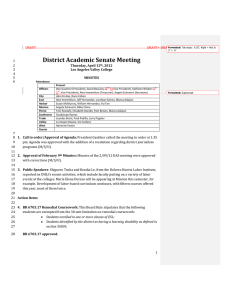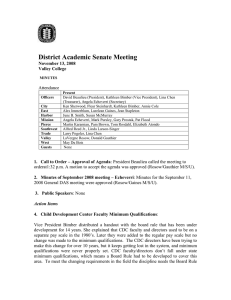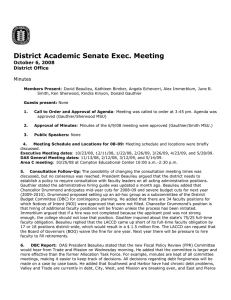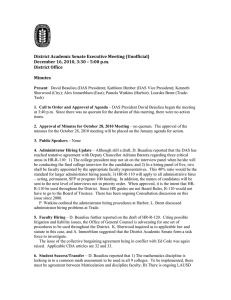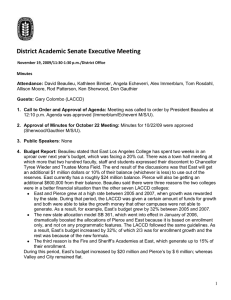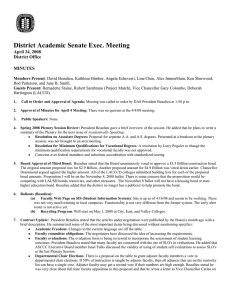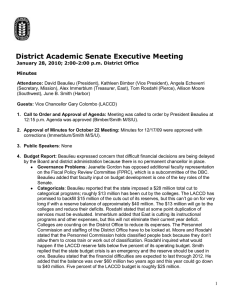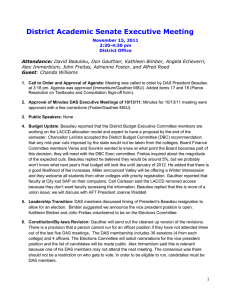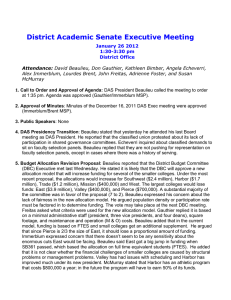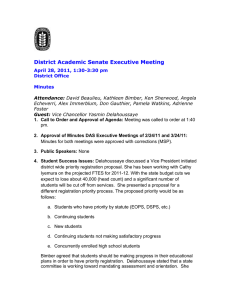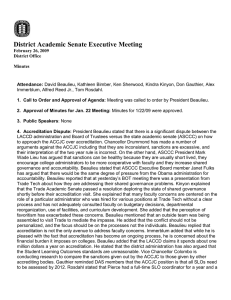District Academic Senate Executive Meeting
advertisement
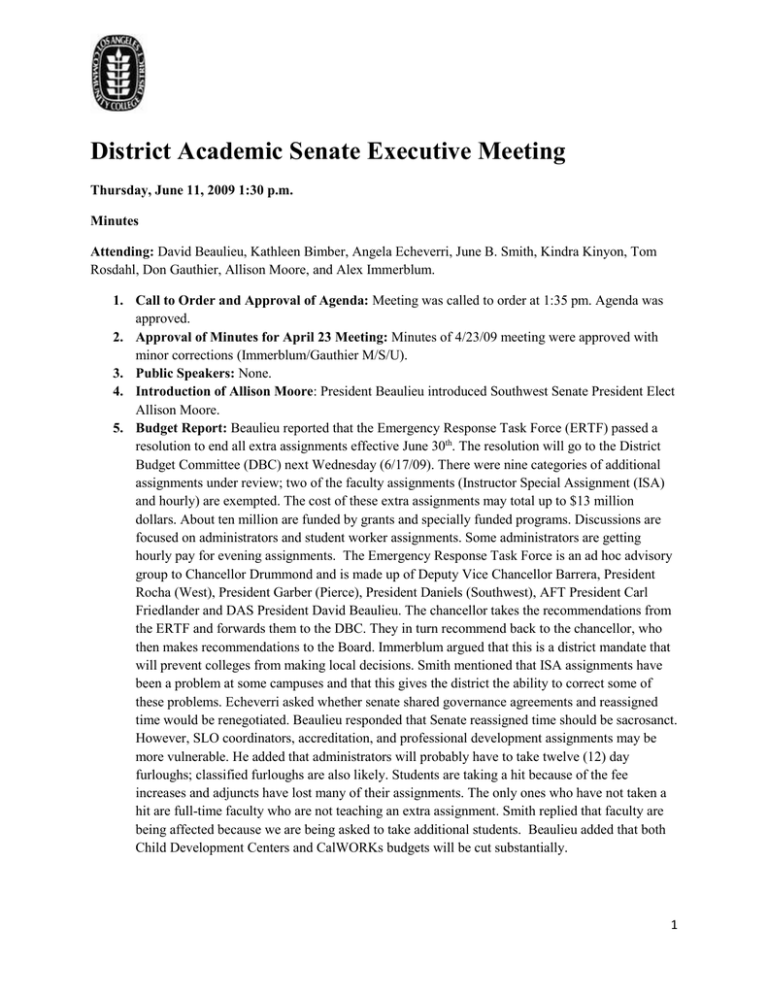
District Academic Senate Executive Meeting Thursday, June 11, 2009 1:30 p.m. Minutes Attending: David Beaulieu, Kathleen Bimber, Angela Echeverri, June B. Smith, Kindra Kinyon, Tom Rosdahl, Don Gauthier, Allison Moore, and Alex Immerblum. 1. Call to Order and Approval of Agenda: Meeting was called to order at 1:35 pm. Agenda was approved. 2. Approval of Minutes for April 23 Meeting: Minutes of 4/23/09 meeting were approved with minor corrections (Immerblum/Gauthier M/S/U). 3. Public Speakers: None. 4. Introduction of Allison Moore: President Beaulieu introduced Southwest Senate President Elect Allison Moore. 5. Budget Report: Beaulieu reported that the Emergency Response Task Force (ERTF) passed a resolution to end all extra assignments effective June 30th. The resolution will go to the District Budget Committee (DBC) next Wednesday (6/17/09). There were nine categories of additional assignments under review; two of the faculty assignments (Instructor Special Assignment (ISA) and hourly) are exempted. The cost of these extra assignments may total up to $13 million dollars. About ten million are funded by grants and specially funded programs. Discussions are focused on administrators and student worker assignments. Some administrators are getting hourly pay for evening assignments. The Emergency Response Task Force is an ad hoc advisory group to Chancellor Drummond and is made up of Deputy Vice Chancellor Barrera, President Rocha (West), President Garber (Pierce), President Daniels (Southwest), AFT President Carl Friedlander and DAS President David Beaulieu. The chancellor takes the recommendations from the ERTF and forwards them to the DBC. They in turn recommend back to the chancellor, who then makes recommendations to the Board. Immerblum argued that this is a district mandate that will prevent colleges from making local decisions. Smith mentioned that ISA assignments have been a problem at some campuses and that this gives the district the ability to correct some of these problems. Echeverri asked whether senate shared governance agreements and reassigned time would be renegotiated. Beaulieu responded that Senate reassigned time should be sacrosanct. However, SLO coordinators, accreditation, and professional development assignments may be more vulnerable. He added that administrators will probably have to take twelve (12) day furloughs; classified furloughs are also likely. Students are taking a hit because of the fee increases and adjuncts have lost many of their assignments. The only ones who have not taken a hit are full-time faculty who are not teaching an extra assignment. Smith replied that faculty are being affected because we are being asked to take additional students. Beaulieu added that both Child Development Centers and CalWORKs budgets will be cut substantially. 1 6. Consultation: Kinyon stated she would like to review her college’s preliminary accreditation report, but was told it was confidential. Beaulieu stated he would put the issue on the next consultation agenda. a. State Budget Update: Beaulieu reported that the budget news from Sacramento gets worse every day. In the latest Democratic proposal categorical programs are going to get hit by 50%; EOPS and DSPS will get hit by 15%. Bimber announced that the elimination of CalWORKs had been pulled off the table. The California Community Colleges may be able to get up to $125 million in federal stimulus money. However, the district will still need to cut $50 to 70 million over last year’s budget, not including deferrals. This is 10% of our operational budget. The elimination of the second summer session (classes starting after July 1, 2009) will save about $8 million; the cancellation of the winter 2010 session will save another $8 million. Districts will be held harmless by the state for not meeting enrollment targets for three years. Healthcare savings may total several million dollars and the district can defer paying $6 million into GASB for one or two years. The district will need to take out a loan at 2% interest to remain solvent. Finally, it is being proposed that all Physical Education (PE) classes be funded at a lower noncredit rate. Smith stated that the state legislature is confusing PE, athletics, and health. b. Summer Sessions and Winter Intersession: See above. c. Other steps, Timeline: All proposals need to go to the BOT by July 22nd. Infrastructure members (Mercer, Candaele, and Scott-Hayes) will be coming to the next DBC meeting. 7. Bond Steering Committee: There are some personnel issues at Build LACCD that have come up. James Sohn was the Bond Program Manager of Build LACCD until recently, but he will be leaving. Gauthier and Beaulieu have been on the Energy Task Force, now called the Energy Oversight Committee. They are also working to strengthen the Bond Steering Committee to give it some authority. Beaulieu added that the AFT and Senate leadership had dropped the ball on this issue, because there was no faculty representation on the committee for several years. Gauthier, Sherwood (not a member), and Beaulieu are now attending for the DAS. John McDowell has just returned, reparesenting the AFT. Beaulieu added they were able to ensure that all the committee meetings now have agendas and minutes. a. Energy Oversight Task Force: Gauthier reported that the committee has been looking at what kind of savings could be achieved if investors put money into energy infrastructure. Proposed projects would only generate up to 1 Mega Watt of electricity, most campuses would need 3 Mega Watts. Eisenberg’s energy team made a presentation on what kind of energy options are available, but the real push is toward solar energy. Beaulieu added that Eisenberg has been overselling the energy initiative and has not shared key information with the task force. Furthermore, there are consultants on the Energy Team that do not appear to be qualified. Woody Clark, the director of the energy program, has a PhD in anthropology, but doesn’t have any engineering training. Bharet Patel is an engineer, but is no longer with Build LACCD. Eisenberg tried to push a $120 million energy contract and wanted it approved in one week. In the end the contract was pared back to $65 million. The energy team was promising big savings, but when the Energy Oversight Committee brought in external experts to evaluate the plan they calculated it would be a wash. Gauthier said three colleges have Edison as their energy supplier, but the district is held back because the other colleges have DWP. Beaulieu stated that this year’s DAS 2 8. 9. 10. 11. LACCD Summit could help inform faculty about these plans. September 25th and October 2nd were discussed as tentative dates for the summit. Beaulieu stated he would try to hold the event at the Metropolitan Water Building again. Harbor and Valley buildings were discussed as alternative locations. Smith stated that the new Harbor building is very beautiful, but has a whole list of construction flaws and the faculty offices resemble a dungeon. Gauthier stated there is no provision for faculty supervision of construction sites before projects are finished. Immerblum added it would be helpful for other colleges to learn from each other’s construction mistakes. The consensus was that a breakout on this topic would be very helpful. b. Northeast Academic: Postponed. DE Stakeholders Meeting Update: Postponed. Beaulieu will give report at next meeting. Report on Sustainability/CTE: The district could get around $15 million for energy and another $15 million for health care in the federal stimulus package. This committee is rectifying the previous lack of faculty involvement in CTE decision-making. The next meeting is Friday, June 19th from 9:00 to 11:00 am at 811 Wilshire. Vice Chancellor of Workforce Development Marvin Martinez will be there. Allison Moore suggested a presentation on sustainability and CTE at the summit. DCC Report (Bimber) a. English to ESL-Subject Change Request: Bimber reported that E-64 is being revised. Southwest should not been have been able to put a course subject change request for English 83 and 84 through DCC. The committee needs to look at whether the process should be appealed. The question is whether we review the DCC decision or look at the process. Subject is not an area or attribute that you can change and this did not get caught until after the request went through DCC. Immerblum argued it can be changed, but that is must be aired. Bimber replied that you can change the course title, but not the subject. She added that Southwest should have created its own course, but did not like the fact that Valley was offering ESL content courses under English. Bimber says it should have been sent back to the campus, because the process does not allow for such a change; it should not have gone to DCC. Beaulieu inquired how the ESL Committee can get its concern addressed. Bimber replied that the request should be that all ESL content courses should be listed under ESL. A resolution to this effect was initiated two years ago, but has not been voted on by the DCC. Curriculum chairs would have to take the resolution back to their campuses, and once approved by DCC, Bimber would bring it to the DAS. Bimber added that in its current form, the resolution may not be successful. Valley and Pierce want to keep the classes under English. Immerblum argued that the approach should be to have the English and ESL disciplines discuss this matter first. Bimber asked the DAS Executive to decide that the process as followed was not appropriate. The DAS members recommended that English and ESL have a joint meeting at which Bimber and Beaulieu can act as mediators. EPAC Report: Bimber distributed a draft Administrative Regulation titled “On-Campus Child Care CalWORKs Funding”. She explained that the document had been produced by a joint CalWORKs and CDC Directors Taskforce. The document states each college will develop a Memorandum of Understanding that describes the methodology of allocation of CalWORKs funds to the Child Development Centers. Bimber asked DAS members to please discuss the draft 3 at local senates. The background portion of the draft was written by Vice President of Student Services Yasmin Delahoussaye (Valley). Vote to extend meeting until 4:00 pm (Gauthier/Immerblum M/S/U). 12. Union Issues: The issue of staffed courses with one instructor teaching multiple sections has come up. This is a hiring issue. Given that we need to form a committee with DAS representation to work on Article 33 of the AFT contract, it can be reviewed by them. Kinyon inquired whether the contract trumps a Board rule or vice a versa. Smith replied that the Education code trumps both. State regulations are tantamount to state law according to Smith, but have no teeth. Immerblum wants the task force to move the contract language back to where it was in 2005 and would like the group to present the changes to the DAS Executive Committee. Immerblum, Moore, Smith, and Beaulieu volunteered to work on this. Smith stated that Marymount Palos Verdes was willing to rent Harbor classroom space for the summer and offer 25 classes on their campus, trying to hire the adjuncts that had been assigned to the cancelled classes. The union complained, filed a grievance and President Spinks blocked it. Up to 750 students were not served, and 25 faculty did not get an assignment. Smith stated she wanted to know the basis for this grievance. 13. Consultation agenda items: Additional assignment motion Standard LACCD policy for senate reassigned time Full accreditation report for senates FON and hiring Harbor/Marymount Palos Verdes Summer SFT Summit Budget consultation process Harbor Hiring, Full-time Obligation Number Beaulieu stated the Chancellor’s position is that colleges can replace those who are retiring. Immerblum added that one proposal at the state level is the temporary suspension of the Full-time Obligation Number (FON). Another is the alteration of the 50% rule. 14. Adjourn: The meeting was adjourned at 4:19 pm. Minutes submitted respectfully by DAS Secretary Angela Echeverri. 4
